Hyundai i30 vs Genesis G70 Shooting Brake - Differences and prices compared
Compare performance (140 HP vs 245 HP), boot space and price (24000 £ vs 39600 £ ) at a glance. Find out which car is the better choice for you – Hyundai i30 or Genesis G70 Shooting Brake?
Costs and Efficiency:
Price and efficiency are key factors when choosing a car – and this is often where the real differences emerge.
Hyundai i30 has a decisively advantage in terms of price – it starts at 24000 £ , while the Genesis G70 Shooting Brake costs 39600 £ . That’s a price difference of around 15591 £.
Fuel consumption also shows a difference: Hyundai i30 manages with 5.70 L and is therefore distinct more efficient than the Genesis G70 Shooting Brake with 6.90 L. The difference is about 1.20 L per 100 km.
Engine and Performance:
Under the bonnet, it becomes clear which model is tuned for sportiness and which one takes the lead when you hit the accelerator.
When it comes to engine power, the Genesis G70 Shooting Brake has a decisively edge – offering 245 HP compared to 140 HP. That’s roughly 105 HP more horsepower.
In acceleration from 0 to 100 km/h, the Genesis G70 Shooting Brake is clearly quicker – completing the sprint in 6.40 s, while the Hyundai i30 takes 9.60 s. That’s about 3.20 s faster.
In terms of top speed, the Genesis G70 Shooting Brake performs slightly better – reaching 235 km/h, while the Hyundai i30 tops out at 197 km/h. The difference is around 38 km/h.
There’s also a difference in torque: Genesis G70 Shooting Brake pulls clearly stronger with 440 Nm compared to 253 Nm. That’s about 187 Nm difference.
Space and Everyday Use:
Beyond pure performance, interior space and usability matter most in daily life. This is where you see which car is more practical and versatile.
Both vehicles offer seating for 5 people.
In curb weight, Hyundai i30 is noticeable lighter – 1291 kg compared to 1727 kg. The difference is around 436 kg.
In terms of boot space, the Genesis G70 Shooting Brake offers a bit more room – 465 L compared to 395 L. That’s a difference of about 70 L.
In maximum load capacity, the Genesis G70 Shooting Brake performs slightly better – up to 1535 L, which is about 234 L more than the Hyundai i30.
When it comes to payload, Hyundai i30 slightly takes the win – 509 kg compared to 448 kg. That’s a difference of about 61 kg.
Who comes out on top?
Overall, the Genesis G70 Shooting Brake shows itself to be outperforms in nearly all aspects and secures the title of DriveDuel Champion.
It convinces with the more balanced overall package and proves to be the more versatile choice for everyday use.
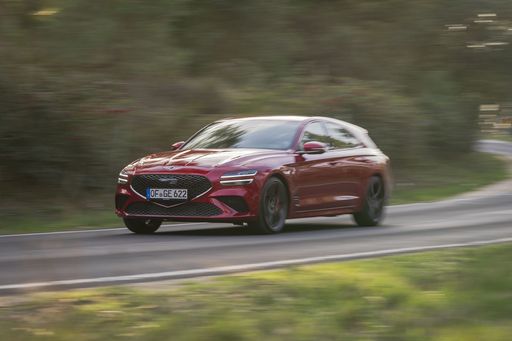
Genesis G70 Shooting Brake
Costs and Consumption
View detailed analysis
Engine and Performance
View detailed analysis
Dimensions and Body
View detailed analysis
Hyundai i30
The Hyundai i30 proves that sensible can also be stylish, offering a confident driving character wrapped in neat, modern design. It serves up a roomy, well-equipped cabin and composed ride that make everyday motoring feel like a clever purchase rather than a compromise.
details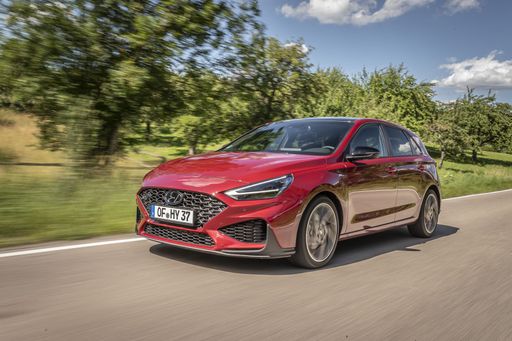
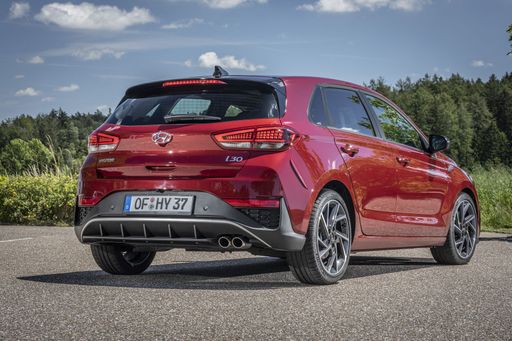
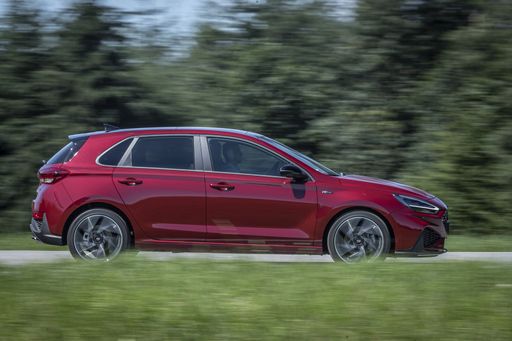
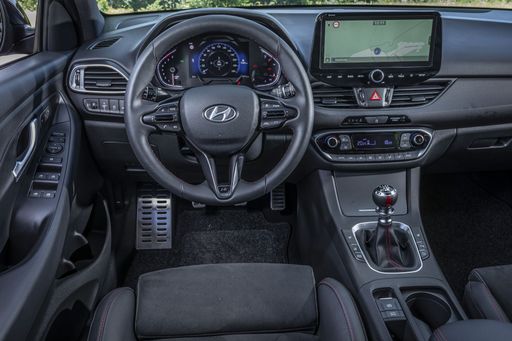
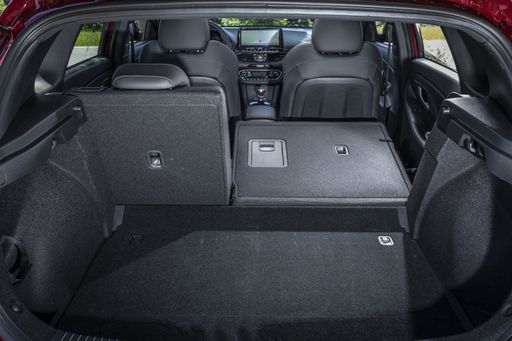
Genesis G70 Shooting Brake
The Genesis G70 Shooting Brake turns the sporty saloon into a rakish estate, wrapping sleek fastback lines around a surprisingly practical rear while still feeling eager on a twisty road. Inside it spoils with premium materials and clever packaging, making it an irresistible choice for buyers who want luxury and usable cargo without sacrificing driving fun — a rare combo that actually makes sense.
details
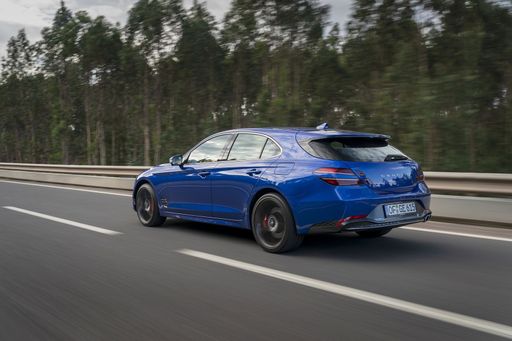
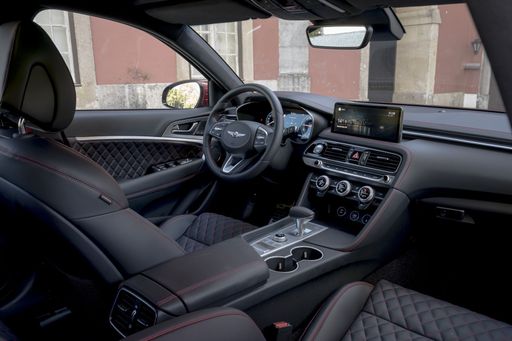
Costs and Consumption |
|
|---|---|
|
Price
24000 - 29300 £
|
Price
39600 - 45500 £
|
|
Consumption L/100km
5.7 - 6 L
|
Consumption L/100km
6.9 - 9.3 L
|
|
Consumption kWh/100km
-
|
Consumption kWh/100km
-
|
|
Electric Range
-
|
Electric Range
-
|
|
Battery Capacity
-
|
Battery Capacity
-
|
|
co2
130 - 136 g/km
|
co2
180 - 212 g/km
|
|
Fuel tank capacity
50 L
|
Fuel tank capacity
60 L
|
Dimensions and Body |
|
|---|---|
|
Body Type
Hatchback
|
Body Type
Estate
|
|
Seats
5
|
Seats
5
|
|
Doors
5
|
Doors
5
|
|
Curb weight
1291 - 1407 kg
|
Curb weight
1727 - 1897 kg
|
|
Trunk capacity
395 L
|
Trunk capacity
465 L
|
|
Length
4340 mm
|
Length
4685 mm
|
|
Width
1795 mm
|
Width
1850 mm
|
|
Height
1455 mm
|
Height
1400 mm
|
|
Max trunk capacity
1301 L
|
Max trunk capacity
1535 L
|
|
Payload
463 - 509 kg
|
Payload
438 - 448 kg
|
Engine and Performance |
|
|---|---|
|
Engine Type
Petrol, Petrol MHEV
|
Engine Type
Petrol, Diesel
|
|
Transmission
Manuel, Automatic
|
Transmission
Automatic
|
|
Transmission Detail
Manual Gearbox, Dual-Clutch Automatic
|
Transmission Detail
Automatic Gearbox
|
|
Drive Type
Front-Wheel Drive
|
Drive Type
Rear-Wheel Drive, All-Wheel Drive
|
|
Power HP
100 - 140 HP
|
Power HP
200 - 245 HP
|
|
Acceleration 0-100km/h
9.6 - 13.1 s
|
Acceleration 0-100km/h
6.4 - 8.2 s
|
|
Max Speed
178 - 197 km/h
|
Max Speed
225 - 235 km/h
|
|
Torque
172 - 253 Nm
|
Torque
353 - 440 Nm
|
|
Number of Cylinders
3 - 4
|
Number of Cylinders
4
|
|
Power kW
74 - 103 kW
|
Power kW
147 - 180 kW
|
|
Engine capacity
998 - 1482 cm3
|
Engine capacity
1998 - 2199 cm3
|
General |
|
|---|---|
|
Model Year
2024
|
Model Year
2021 - 2023
|
|
CO2 Efficiency Class
D, E
|
CO2 Efficiency Class
G
|
|
Brand
Hyundai
|
Brand
Genesis
|
What drive types are available for the Hyundai i30?
Available configurations include Front-Wheel Drive.




